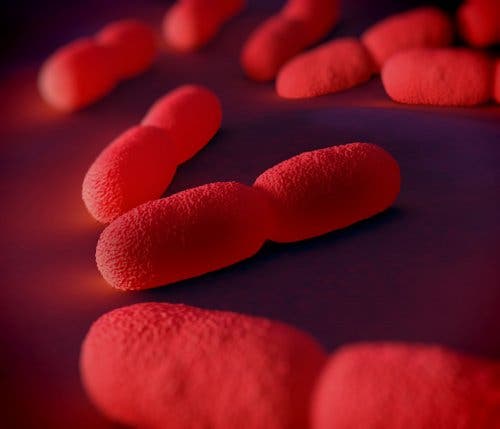6 Signs that Your Child Needs Probiotics

Probiotics are an excellent alternative for the prevention and management of certain intestinal disorders, especially in children. However, not all of them help fight the same diseases and not all of them require probiotics to improve. Therefore, you must learn to recognize the signs that your child needs probiotics to consult a doctor and include them in the diet effectively.
Probiotics are an ally to maintain body functions such as digestion, increase defenses, and balance the intestinal microbiota. But do you know when to use them in children, and what the most common diseases to combat with probiotics are?
In this blog, we’ll answer these questions and show you the 6 signs that will indicate the ideal time to use probiotics during a health problem. Don’t forget that just like any other treatment, your child’s pediatrician is the one who’ll give the corresponding indications.
What are probiotics?
A group of experts established by consensus that probiotics are live microorganisms, mainly bacteria and yeasts, which when ingested in adequate amounts, can provide health benefits. This is reported in the journal Nature Reviews Gastroenterology & Hepatology.
The most clinically used probiotics are distinguished by their names. Among the yeasts, Saccharomyces cerevisiae, and among the bacteria, what’s known as lactic acid bacteria (LAB), such as Lactobacillus, Streptococcus, Pediococcus, Bifidobacterium, Propionibacterium, Bacillus, and Enterococcus.
How can you know if your child needs probiotics when going through an illness? Let’s take a look.

6 signs that your child needs probiotics
Evidence shows us that some illnesses, such as those arising from an intestinal imbalance, give some identifiable signs that could be treated with the use of probiotics. Of course, your child’s pediatrician is the professional in charge of making the indications. Let’s see what these signs are.
1. Gastrointestinal signs due to antibiotic use
As suggested by the Korpela working group through the journal Nature Communications, antibiotics can alter the balance of the intestinal microbiota, i.e. bacteria, their genes, and metabolites. This can lead to problems such as abdominal cramps, gas, vomiting, bloating, and even constant diarrhea.
The organization Healthy Children explains that these symptoms can be relieved with the use of probiotics, especially Lactobacillus, Bifidobacterium, and Saccharomyces.
2. Acute viral diarrhea
The Chilean Journal of Nutrition highlights that acute viral diarrhea can be combated with the use of different types of lactobacilli, such as L. reuteri, L. acidofilus, and L. bulgaricus. They’re capable of reducing the severity and duration of diarrhea. Moreover, they’re so effective that after one day of treatment, the disease is controlled.
This is consistent with a more recent study published in the journal Translational Pediatrics in 2021, which states that in order to shorten the time of acute diarrhea, probiotics should be combined, in this case, L. reuteri with Saccharomyces boulardii.
3. Skin problems (eczema)
A review reported in the journal Pediatric Allergy and Immunology in 2020 revealed that the use of probiotics can modify the composition of the intestinal flora of children, to the benefit of a reduction in atopic dermatitis. However, some results are still inconclusive.
At the same time, a study published in the journal JAMA Pediatrics in 2016, suggests that the combination of mixed strains of probiotics with prebiotics may be more efficient for the prevention and treatment of this disease of allergic origin in children 1 or more years of age.
Carlos Cuello’s team also highlights the importance of probiotics to treat eczema, but it must be done during pregnancy and breastfeeding. This is suggested in an article published in The Journal of Allergy and Clinical Immunology in 2015.

4. Infant colic
Some recent studies advocate for the use of probiotics such as L. reuteri in the control of infant colic (reduction of crying, regurgitation, and number of bowel movements). This is the case of a randomized clinical trial published in the Journal of Pediatrics in 2017. It was considered a safe treatment for the nursing infant, achieving resolution of colic within 3 weeks of trial.
Another more recent paper in the journal Pediatrics claims that L. reuteri is effective and can be recommended to treat infant colic. Although they stress that more research is needed.
5. Constipation
The use of probiotics for the management of constipation in children is recognized. A paper in Frontiers in Cellular and Infection Microbiology in 2017 shows that the use of probiotics increases stool frequency in Asian children with constipation.
Another 2017 study published in the journal The American Journal of Gastroenterology provides evidence of the superior efficacy of probiotics in improving chronic constipation in children compared to those who didn’t ingest them. The probiotic treatment was also found to be safe.
A pilot study shown in the Nutrition Journal showed that Bifidobacterium breve was effective in increasing the frequency of bowel movements in children with constipation.

6. Frequent respiratory infections
A review in the journal The British Journal of Nutrition reported that probiotics such as Lactobacillus and Bifidobacterium strains can reduce the duration of acute respiratory infections in children and adults.
How to add probiotics to my child’s diet?
For infants up to 6 months of age, breast milk is responsible for supplying both probiotics and prebiotics, as it contains certain carbohydrates that serve as a substrate to help the growth of beneficial bacteria.
From complementary feeding onwards, probiotics can be incorporated into your child’s diet through fermented food products. Some of them are yogurt, sour milks, kefir, sauerkraut, and kimchi, among other products.
In addition, probiotic supplements are available in capsules, powders, and liquids, but the indication of each type of probiotic for each disease is in the hands of your child’s pediatrician.
What to do if I notice the signs that my child needs probiotics?
When observing the signs in our children, the first action is to go immediately to the pediatrician and describe the signs and symptoms that appear with some frequency in your child. They should be consulted about the use of probiotics for the treatment of the symptoms and the disease.
Some frequent signs such as diarrhea, constipation, allergic skin processes, gas, abdominal distension, and colic, among others, can be treated with probiotics, as long as the pediatrician so establishes.
All cited sources were thoroughly reviewed by our team to ensure their quality, reliability, currency, and validity. The bibliography of this article was considered reliable and of academic or scientific accuracy.
- Chang, Y. S., Trivedi, M. K., Jha, A., Lin, Y. F., Dimaano, L., & García-Romero, M. T. (2016). Synbiotics for Prevention and Treatment of Atopic Dermatitis: A Meta-analysis of Randomized Clinical Trials. JAMA pediatrics, 170(3), 236–242. https://doi.org/10.1001/jamapediatrics.2015.3943
- Cuello-Garcia, C. A., Brożek, J. L., Fiocchi, A., Pawankar, R., Yepes-Nuñez, J. J., Terracciano, L., Gandhi, S., Agarwal, A., Zhang, Y., & Schünemann, H. J. (2015). Probiotics for the prevention of allergy: A systematic review and meta-analysis of randomized controlled trials. The Journal of allergy and clinical immunology, 136(4), 952–961. https://doi.org/10.1016/j.jaci.2015.04.031
- D’Elios, S., Trambusti, I., Verduci, E., Ferrante, G., Rosati, S., Marseglia, G. L., Drago, L., & Peroni, D. G. (2020). Probiotics in the prevention and treatment of atopic dermatitis. Pediatric allergy and immunology : official publication of the European Society of Pediatric Allergy and Immunology, 31 Suppl 26, 43–45. https://doi.org/10.1111/pai.13364
- Fatheree, N. Y., Liu, Y., Taylor, C. M., Hoang, T. K., Cai, C., Rahbar, M. H., Hessabi, M., Ferris, M., McMurtry, V., Wong, C., Vu, T., Dancsak, T., Wang, T., Gleason, W., Bandla, V., Navarro, F., Tran, D. Q., & Rhoads, J. M. (2017). Lactobacillus reuteri for Infants with Colic: A Double-Blind, Placebo-Controlled, Randomized Clinical Trial. The Journal of pediatrics, 191, 170–178.e2. https://doi.org/10.1016/j.jpeds.2017.07.036
- Healthychildren. ¿Pueden los probióticos ayudar a prevenir los problemas de estómago cuando mi hijo tiene que tomar antibióticos? Última actualización: 12/24/ 2021. Disponible en: https://www.healthychildren.org/spanish/tips-tools/ask-the-pediatrician/paginas/can-probiotics-help-prevent-tummy-trouble.aspx
- Hill, C., Guarner, F., Reid, G. et al. (2014). The International Scientific Association for Probiotics and Prebiotics consensus statement on the scope and appropriate use of the term probiotic. Nat Rev Gastroenterol Hepatol 11, 506–514. https://doi.org/10.1038/nrgastro.2014.66
- Korpela, K., Salonen, A., Virta, L. J., Kekkonen, R. A., Forslund, K., Bork, P., & de Vos, W. M. (2016). Intestinal microbiome is related to lifetime antibiotic use in Finnish pre-school children. Nature communications, 7, 10410. https://doi.org/10.1038/ncomms10410Healthychildren.
- Huang, R., & Hu, J. (2017). Positive Effect of Probiotics on Constipation in Children: A Systematic Review and Meta-Analysis of Six Randomized Controlled Trials. Frontiers in cellular and infection microbiology, 7, 153. https://doi.org/10.3389/fcimb.2017.00153
- Huang, R., Xing, H. Y., Liu, H. J., Chen, Z. F., & Tang, B. B. (2021). Efficacy of probiotics in the treatment of acute diarrhea in children: a systematic review and meta-analysis of clinical trials. Translational pediatrics, 10(12), 3248–3260. https://doi.org/10.21037/tp-21-511
- King, S., Glanville, J., Sanders, M. E., Fitzgerald, A., & Varley, D. (2014). Effectiveness of probiotics on the duration of illness in healthy children and adults who develop common acute respiratory infectious conditions: a systematic review and meta-analysis. The British journal of nutrition, 112(1), 41–54. https://doi.org/10.1017/S0007114514000075
- Manzano A, Claudia, Estupiñán G, Diana, & Poveda E, Elpidia. (2012). EFECTOS CLÍNICOS DE LOS PROBIÓTICOS: QUÉ DICE LA EVIDENCIA. Revista chilena de nutrición, 39(1), 98-110. https://dx.doi.org/10.4067/S0717-75182012000100010
- Sung, V., D’Amico, F., Cabana, M. D., Chau, K., Koren, G., Savino, F., Szajewska, H., Deshpande, G., Dupont, C., Indrio, F., Mentula, S., Partty, A., & Tancredi, D. (2018). Lactobacillus reuteri to Treat Infant Colic: A Meta-analysis. Pediatrics, 141(1), e20171811. https://doi.org/10.1542/peds.2017-1811
- Tabbers, M. M., de Milliano, I., Roseboom, M. G., & Benninga, M. A. (2011). Is Bifidobacterium breve effective in the treatment of childhood constipation? Results from a pilot study. Nutrition journal, 10, 19. https://doi.org/10.1186/1475-2891-10-19